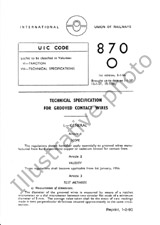We need your consent to use the individual data so that you can see information about your interests, among other things. Click "OK" to give your consent.

UIC 541-3-8ed.
Brakes - Disc brakes and their application - General conditions for the certification of brake pads
Translate name
STANDARD published on 1.4.2017
The information about the standard:
Designation standards: UIC 541-3-8ed.
Publication date standards: 1.4.2017
SKU: NS-683568
The number of pages: 93
Approximate weight : 310 g (0.68 lbs)
Country: International technical standard
Category: Technical standards UIC
Annotation of standard text UIC 541-3-8ed. :
Name:Bremsen - Scheibenbremse und ihre Anwendungen - Allgemeine Bedingungen für die Zertifizierung von Bremsbelägen
We recommend:
Technical standards updating
Do you want to make sure you use only the valid technical standards?
We can offer you a solution which will provide you a monthly overview concerning the updating of standards which you use.
Would you like to know more? Look at this page.



 Cookies
Cookies
